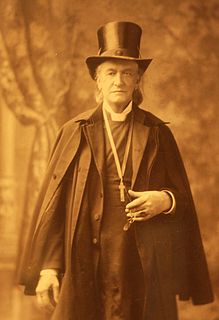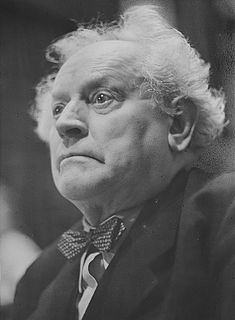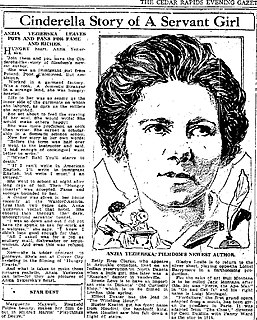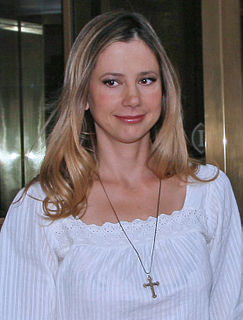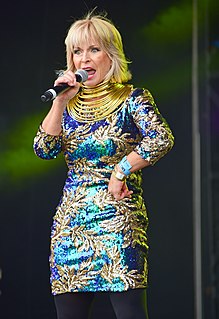A Quote by Fyodor Dostoevsky
What tender and devoted mother wouldn't be dismayed and ill with terror at her son's or daughter's stepping even one hair's breath off the beaten track. No, better let him be happy and live in comfort without originality, is what every mother thinks when she rocks the cradle. The only person among us who can fail to reach the general's rank is the original man - in other words, the man who won't be quiet.
Quote Topics
Related Quotes
Without religion, man is an atheist, woman is a monster. As daughter, sister, wife and mother, she holds in her hands, under God, the destinies of humanity. In the hours of gloom and sorrow we look to her for sympathy and comfort. Where shall she find strength for trial, comfort for sorrow, save in that gospel which has given a new meaning to the name of "mother," since it rested on the lips of the child Jesus?
As Anna Freud remarked, the toddler who wanders off into some other aisle, feels lost, and screams anxiously for his mother neversays "I got lost," but accusingly says "You lost me!" It is a rare mother who agrees that she lost him! she expects her child to stay with her; in her experience it is the child who has lost track of the mother, while in the child's experience it is the mother who has lost track of him. Each view is entirely correct from the perspective of the individual who holds it .
I've borne the shame of mother while you bought her off with a present and a treat here and there. God knows how hard I tried to civilize her so as not to have to blush with shame when I take her anywhere. I dressed her in the most stylish Paris models, but Delancey Street sticks out from every inch of her. Whenever she opens her mouth, I'm done for. You fellows had your chance to rise in the world because a man is free to go up as high as he can reach up to; but I, with all my style and pep, can't get a man my equal because a girl is always judged by her mother.
The mother cannot expect her daughter to understand the mysteries of housekeeping without education. She should instruct them patiently, lovingly, and make the work as agreeable as she can by her cheerful countenance and encouraging words of approval. If they fail once, twice, or thrice, censure not.
For a mother the project of raising a boy is the most fulfilling project she can hope for. She can watch him, as a child, play the games she was not allowed to play; she can invest in him her ideas, aspirations, ambitions, and values - or whatever she has left of them; she can watch her son, who came from her flesh and whose life was sustained by her work and devotion, embody her in the world. So while the project of raising a boy is fraught with ambivalence and leads inevitably to bitterness, it is the only project that allows a woman to be - to be through her son, to live through her son.
To no man does the earth mean so much as to the soldier. When he presses himself down upon her long and powerfully, when he buries his face and his limbs deep in her from the fear of death by shell-fire, then she is his only friend, his brother, his mother; he stifles his terror and his cries in her silence and her security; she shelters him and releases him for ten seconds to live, to run, ten seconds of life; receives him again and again and often forever.
Sometimes we adopt certain beliefs when we're children and use them automatically when we become adults, without ever checking them out against reality. This brings to mind the story of the woman who always cut off the end of the turkey when she put it in the oven. Her daughter asked her why, and her mother responded, "I don't know. My mother always did it." Then she went and asked her mother, who said, "I don't know. My mother always did it." The she went and asked her grandmother, who said, "The oven wasn't big enough."
I mean, her father was an alcoholic, and her mother was the suffering wife of a man who she could never predict what he would do, where he would be, who he would be. And it's sort of interesting because Eleanor Roosevelt never writes about her mother's agony. She only writes about her father's agony. But her whole life is dedicated to making it better for people in the kind of need and pain and anguish that her mother was in.
I once picked up a woman from a garbage dump and she was burning with fever; she was in her last days and her only lament was: My son did this to me. I begged her: You must forgive your son. In a moment of madness, when he was not himself, he did a thing he regrets. Be a mother to him, forgive him. It took me a long time to make her say: I forgive my son. Just before she died in my arms, she was able to say that with a real forgiveness. She was not concerned that she was dying. The breaking of the heart was that her son did not want her. This is something you and I can understand.
Her [Mary's] motherhood extends beyond view. In the will of the Son, she becomes at once mother and maid: sheltering him, but sheltered in him, forming him, but formed by him ... When she pronounces the words: 'Be it done to me according to thy word', the Mother conceives the mystery from the Trinity, in order to give it to the Son. The Son gives the word back to the Trinity by giving everything he has back to the Father in the Spirit. Then, after the Father has received it again, it is distributed to mankind by means of that extravagant expansioning-the Eucharist and the Holy Spirit.
Her [Eleanor Roosevelt] father was the love of her life. Her father always made her feel wanted, made her feel loved, where her mother made her feel, you know, unloved, judged harshly, never up to par. And she was her father's favorite, and her mother's unfavorite. So her father was the man that she went to for comfort in her imaginings.

